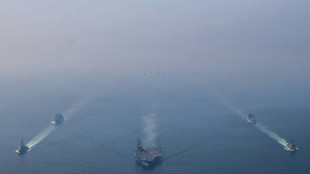
Israel says area of airport hit after Yemen missile launch

A missile launched from Yemen struck near Israel's main international airport on Sunday, authorities said, an attack that briefly halted air traffic and triggered threats of retaliation.
There was no immediate claim of responsibility for the missile fire, which follows a series of attacks by Yemen's Huthi rebels.
Police reported a "missile impact" near Ben Gurion International Airport outside Tel Aviv after the military said that "several attempts were made to intercept" it.
It was not immediately clear whether the impact was caused by the Yemeni missile or by an interceptor.
Yair Hezroni, the police's central district chief, said at the scene in a video released by the force that "you can see the area just behind us: a crater was formed here, several dozen metres (yards) wide and several dozen metres deep".
The police footage showed officers standing at the edge of a crater in an orchard, with the airport's control tower visible in the distance.
AFP journalists said they had heard explosions in the area of Jerusalem and the airport, after air raid sirens sounded in several parts of the country.
Israel's airport authority said that "departures and arrivals have resumed" at Ben Gurion, a short while after they had been interrupted due to the missile fire.
The airport "is open and operational", the aviation authority said in a statement.
- Vow to hit back -
Defence Minister Israel Katz threatened a forceful response, saying: "Anyone who hits us, we will hit them seven times stronger."
The Iran-backed Huthi rebels, who control swathes of Yemen, have launched missiles and drones targeting Israel and Red Sea shipping throughout the Gaza war, saying they are acting in solidarity with Palestinians.
On Saturday, the Huthis claimed a third missile attack on Israel in two days.
The vast majority of missiles fired by the Huthis since the start of the Gaza war in 2023 have been intercepted by Israeli air defences.
But in March, they threatened to resume attacks on international shipping over Israel's aid blockade on the Gaza Strip.
The move triggered a response from the US military, which began hammering the rebels with near-daily air strikes starting March 15 in a bid to keep them from threatening shipping in the Red Sea and Gulf of Aden.
US strikes on the rebels began under former president Joe Biden, but intensified under his successor Donald Trump.
Since March, the United States says it has struck more than 1,000 targets in Yemen.
N.Son--SG

 London
London

 Manchester
Manchester
 Glasgow
Glasgow
 Dublin
Dublin
 Belfast
Belfast
 Washington
Washington
 Denver
Denver
 Atlanta
Atlanta
 Dallas
Dallas
 Houston Texas
Houston Texas
 New Orleans
New Orleans
 El Paso
El Paso
 Phoenix
Phoenix
 Los Angeles
Los Angeles



